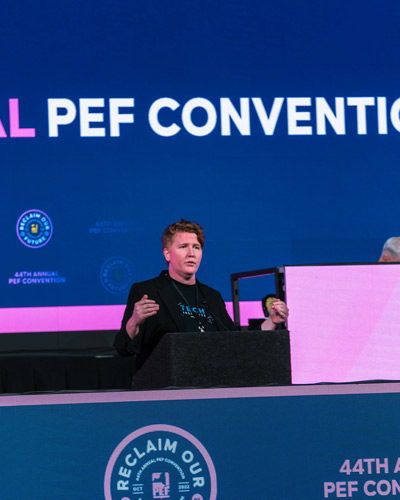
In November 2020, after 66 years, toll collectors along the New York State Thruway signed off for the last time. All 1,100 of them — 200 full-time, 900 part-time — either retired or moved on to other state or private employment when their jobs were eliminated.
Why where they eliminated?
Technology.
The $355 million conversion to cashless tolling reduces congestion through free-flowing traffic and reduces emissions by eliminating idling at toll booths, the Thruway Authority said. Good for the environment; bad for working men and women losing their livelihood.
PEF is ready to tackle the impact of artificial intelligence on the workforce.

At this year’s annual Convention in October, PEF President Wayne Spence invited Amanda Ballantyne, executive director of the New York State AFL-CIO’s Technology Institute, to address delegates about the impact of artificial intelligence and technology on public-sector jobs.
“Looking at digitization as a legislative priority, I think that is really smart,” Ballantyne said to the delegates. “The labor movement can help shape these platforms for working people. Millions of jobs can be impacted by digitization technology. It is so important for the future of our economy that the labor movement gets involved.”
In the 2023 State and Legislative Agendas approved at Convention, PEF included a priority on technology, asking for a seat at the table and input in the process.
“PEF, working with its national affiliates AFT and SEIU, will advocate for federal and state legislation, regulations and/or provisions in the PEF contract to increase members’ protection by allowing transparency and control over members’ personal data, and advocate for the development of a digitalization and artificial intelligence environment where the ultimate responsibility and accountability for the collection, usage and dissemination of personal and other data lies with humans, not with the technology itself,” the agendas read.
Additionally, PEF will work to ensure that all artificial intelligence is grounded in ethical values, principles and human rights, including a review of costs, equity, efficiency, inclusiveness and accountability, and PEF will work to ensure that members and the union maintain a voice in each step of the process in the development and implementation of digitalization and artificial intelligence applications, including algorithm design, procurement, training, implementations and assessment.
PEF is already facing it
For PEF members at the Department of Corrections and Community Supervision, the issue hits close to home as parole officers deal with the impact of the state trusting an algorithm over their years of experience and knowledge.
The Correctional Offender Management Profiling for Alternative Sanctions (COMPAS) software uses an algorithm to assess potential recidivism risk in the parolee population. It is supposed to assist DOCCS staff in determining the supervision, treatment, and interventions appropriate for inmates upon entry into the state prison system and for parolees who have violated the terms of their release and are returned to prison. It is also used to evaluate inmates’ suitability for parole, to conduct recurring evaluations of parolees while they are on parole, and to set the level of supervision for parolees
At the September Executive Board meeting, PEF President Wayne Spence announced COMPAS would be the subject of a research grant, secured by PEF from its international parent union SEIU, with an eye toward assessing the technology’s pitfalls.
“Before the algorithm, parole officers used their judgment based on their experience,” he said. Parole officers have already noticed a trend against people of color in the software, Spence said. A variety of research studies focused on the use of COMPAS in other states have found evidence that it does not accurately assess parolees’ risk of recidivism, and some have found that COMPAS exhibits signs of racial bias.
PEF’s study will focus primarily on the impact of COMPAS on the work and working conditions of parole officers and senior parole officers. PEF is also working on obtaining data that will allow it to look at the accuracy of COMPAS assessments.
To obtain reliable results, PEF is conducting a survey and needs as many parole officers and senior parole officers as possible to participate. The survey takes about five minutes to complete. Parole officers and senior parole officers who want to compete the survey but do not have the link can contact PEF staff at compas@pef.org.
The union will use the results of this study in its advocacy efforts.
Learn so you can bargain
The impact of digitization may not just involve taking over job functions. The advent of new technology has and continues to impact how employers monitor their workforce. Knowing how the technology works will help unions bargain for fair use.
“You would be shocked how little management often understands the technology,” Ballantyne told Convention attendees last month.
Unions are best positioned to monitor technology in the workplace and act on issues that arise.
“We care about people,” she said. “We are the organizations that have the structure and the power to push back on these things. You are one of the largest unions in New York state, you can really play a leadership role here. Public-sector unions have a huge stake in what the future looks like.”
“Think about AI and digitization like they are electricity,” she said. When electricity was first introduced, people thought it was novel, but they never fathomed how integral it would become to daily life. “Right now, AI is clunky, but that will change. The question is, will it change for the better?”

